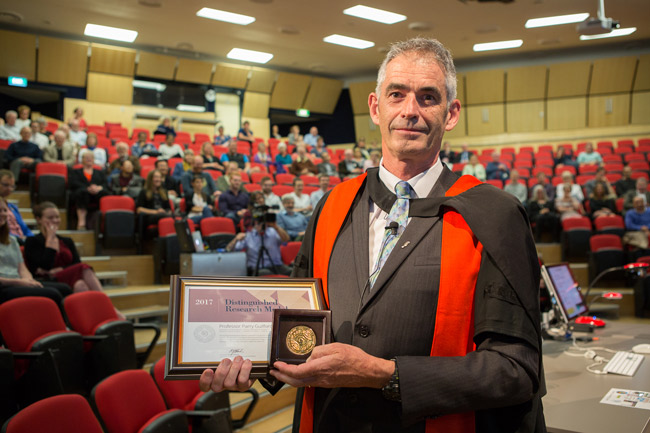
The University of Otago's 2017 Distinguished Research Medal recipient, Professor Parry Guilford. Photo: Sharron Bennett.
Professor Parry Guilford was yesterday presented with the University's 2017 Distinguished Research Medal, during a public lecture held to celebrate the honour.
Professor Guilford, an internationally renowned cancer genetics and biology expert, delivered his lecture on Evolution, families and cancer to a large audience of University staff, students, alumni and the public at the College of Education Auditorium yesterday evening. The audience included his brother Professor Grant Guilford, who is the Vice-Chancellor of Victoria University of Wellington.
In his lecture he discussed the origin of cancer, his research in four different areas across the cancer care continuum, and his thoughts on the future of cancer treatment.
The University awards the Distinguished Research Medal for outstanding scholarly achievement, including the discovery and dissemination of new knowledge, the development of innovative technology, or the development of concepts that lead to significant advances. Professor Guilford was named as this year's winner last month.
"Progress in medicine is incremental; we must be willing to seize opportunities as they arise, even if they aren't the complete solution."
Professor Guilford's many achievements include identifying the first known gene for fatal inherited gastric cancer, which has allowed many lives to be saved worldwide.
His work as Chief Scientist Officer with Pacific Edge Ltd, a spin-off from his research at the University, guided the development of CxBladder, a urine test for bladder cancer, which reduces the need for painful bladder cystoscopies and reduces healthcare costs.
He is also working on new ways to fight lobular breast cancer (the second-most common type of the disease) and diffuse type stomach cancer by investigating the approach of “synthetic lethal targeting”, to see whether cancer cells that lack an important tumour suppressor gene have vulnerabilities that can be targeted with particular drugs.
In his lecture he described the great rewards to be gained from translational research – for both patients and researchers, and he encouraged other researchers to give things a go without fearing failure.
“Progress in medicine is incremental; we must be willing to seize opportunities as they arise, even if they aren't the complete solution,” he said.
He also took the opportunity to thank his family, the patients and cancer families he works with, his research team, the Department of Biochemistry and his funders – in particular the Health Research Council and Healthier Lives – during the lecture.
He says he is deeply humbled to receive this honour.